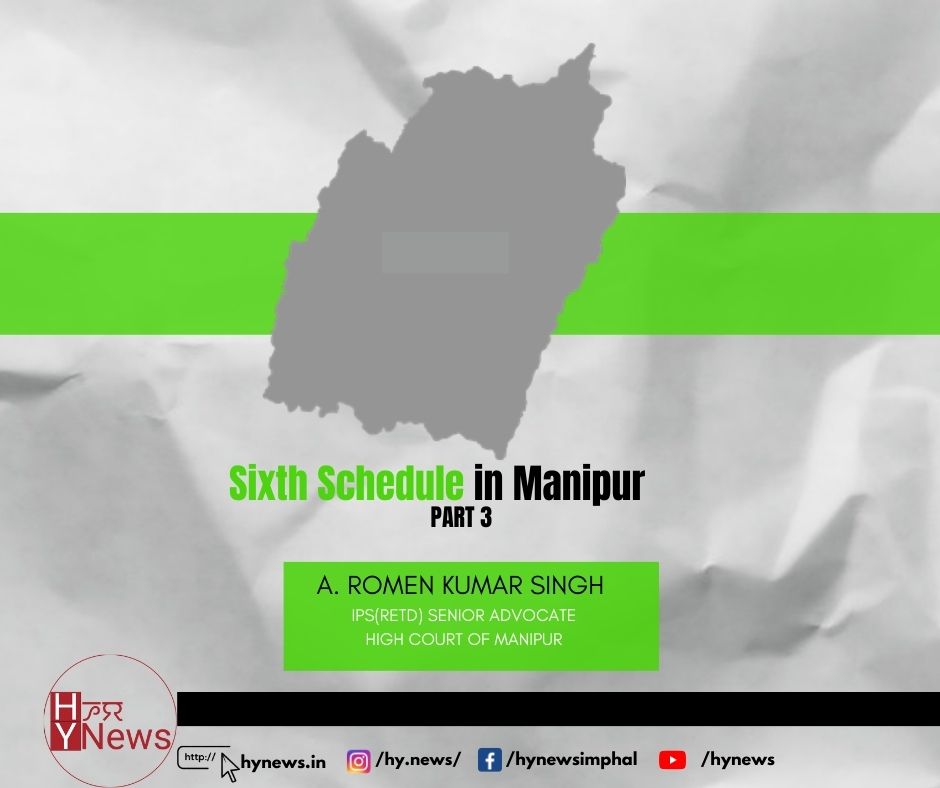
By:
Romen Kumar Singh, IPS(Retd)
Senior Advocate, High Court of Manipur
Basis for granting status of sixth schedule :
The Supreme Court in the case as reported in (1997)8 SCC 191 (Supra) has emphatically mentioned that tribals, on account of their isolation, remained illiterate, uneducated, unsophisticated, poor and destitute. At the same time, the recommendations of the Sub-committees (Supra) mainly focussed that the Government policies should be for the preservation of the tribal's social customs from sudden erosion, and the safeguarding their traditional vocations without the danger of their absolute exploitation by the more sophisticated elements of the population. Illiteracy and exploitation of tribals by elements of population form the basic foundation of applying the provisions of Sixth Schedule.
Sixth Schedule in Manipur :
State of Manipur is the only state of the seven sister states of the North Eastern Region to which the provisions of the Sixth Schedule have never been applied. Manipur was initially a Union Territory, being a Part C State in the First Schedule to the Constitution, having been placed as item No.9. According to Part VIII of the Constitution (Article 239), Part C States were administered by the President through Chief Commissioner or Lieutenant Governor.
The states in the North Eastern Region were reorganised by the North Eastern Areas (Reorganisation) Act, 1971 and by section 3 thereof, the state of Manipur was formed comprising the territories which immediately before that day were comprised in the Union Territory of Manipur.
Separate provisions for constitution of district councils for hill areas of Manipur.
Close on the hills of formation of the state of Manipur by the aforesaid Act, the Manipur (Hill Areas) District Council Act, 1971 (Act 76 of 1971) was passed by the Parliament for constitution of District Councils for the Hill Areas of the state of Manipur. the aforesaid Act has been replaced by the state enactment namely, the Manipur Hill Areas Autonomous District Council Act, 2000 (Manipur Act 11 of 2000) wherein details provisions are made for the functioning of the District Council is constituted in the Hill Areas of the State. District Councils have been constituted in all the five Hill Districts of Manipur.
These are:
1. Ukhrul Autonomous District Council, Ukhrul
2. Tamenglong Autonomous District Council, Tamenglong
3. Churachandpur Autonomous District Council, Churachandpur
4. Chandel Autonomous District Council, Chandel
5. Senapati Autonomous District Council, Senapati
6. Sadar Hills Autonomous District Council, Kangpokpi
Insertion of Article 371 C
By the Constitution (27th Amendment) Act, 1971, Article 371 C has been inserted whereby the Parliament has been empowered to constitute a Committee of Legislative Assembly for the Hill Areas of the State. Further, the Governor is required to make annual report to the President regarding administration of the Hill areas of the State. It further provides that executive power of the Union extends to giving direction to the State in the administration of said areas.
Power of the governor under Sixth Schedule to be exercised on the aid and advice of council of ministers.
Power under Sixth Schedule : Pu Myllai Hlychho Vs State of Mizoram (2005) 2 SCC 92
Constitution bench of the Supreme Court held as below
Page 94 – Para 1: (i) The provisions of the Sixth Schedule to the Constitution have evolved a separate scheme for the administration of the tribal areas in Assam, Maghalaya, Mizoram and Tripura through the institution of District Councils or Regional Councils. These Councils are vested with legislative power on specified subjects, allotted sources of taxation and given powers to setup and administer their system of justice and maintain administrative and welfare services in respect of land, revenue, forests, education, public health etc.
(ii) Satisfaction of governor required by constitution is not personal satisfaction.
Page 98 – Para 15 : The executive power also partakes the legislative or certain judicial action. Wherever the Constitution requires the satisfaction of the Governor for the exercise of power or function, the satisfaction required by the Constitution is not personal satisfaction of the Governor but the satisfaction in the Constitutional sense under the cabinet system of government.
The Governor exercises functions conferred on him by or under the Constitution with the aid and advice of the Council of Ministers and he is competent to make rules for convenient transaction of the business of the Government of the State, by the allocation of business among the Ministers under Article 166(3) of the Constitution.
It is the fundamental principle of English Constitutional Law that the Ministers must accept the responsibility for every executive act. It may also be noticed that in regard to the executive action taken in the name of the Governor, he can not be sued for any executive action of the State and Article 300 specifically states that the Government of state may sue or may be sued in the name of the state subject to the restriction placed therein.
Powers of the president and governor are similar to crown under the parliamentary system.
This Court has consistently taken the view that the powers of the President and the Governor are similar to the powers of the CROWN under the British Parliamentary System. We followed the principle in (1) Rai Sahib Ramjawaya Kapur Vs. State of Punjab, AIR 1955 S.C. 549, A. Sanjeevi Naidu V. State of Madras, (1970)1 SCC 443 and U.N.R Rao V. Indira Gandhi, (1971) 2 SCC 63.
(iii) Termination of four members from mara authonomous district council by the governor of mizoram on the advice of council of ministers is perfectly in accordance with Sixth Schedule.
Page 103 – Para 32 : In the result, we hold that the Governor was bound by the aid and advice of the Council of Ministers and the termination of the four members from MADC by order of the Governor on 5.12.2001 was perfectly in accordance with the constitutional provisions and the Sixth Schedule to the Constitution.
For nomination of members governor was justified in making consultation with council of ministers
The nomination of the four members to the council by orders dated 6.12.2001 was legal and the Governor acted by virtue of the discretionary power vested in him. The Governor was justified in making consultation with the Council of Ministers and the Governor making such incidental consultation with the Council of Ministers did not in any way affect the discretionary power.
No other authority interfered with the independent exercise of the Governor's discretion in nominating the four members of MADC and the notification issued by the Governor on 6.12.2001 was validly made and the decision of the Division Bench of the Gauhati High Court does not call for any interference.







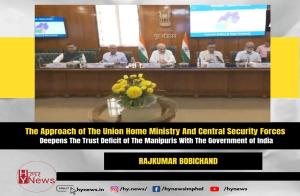
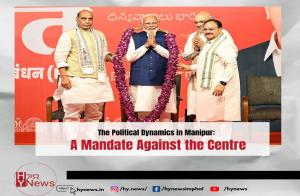


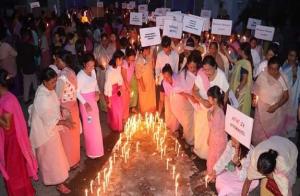



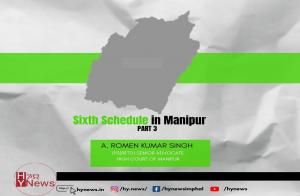
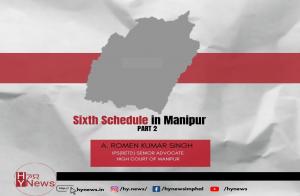
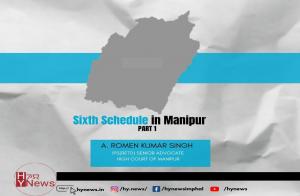









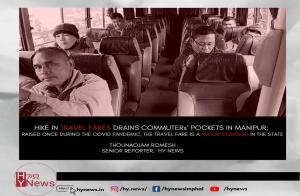








Leave Comments